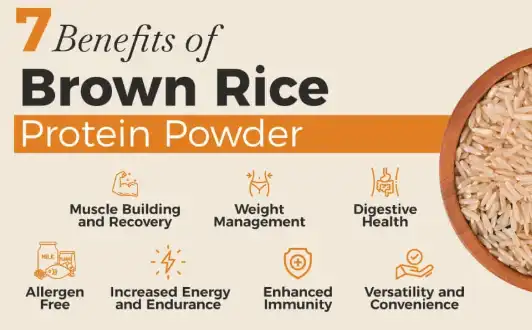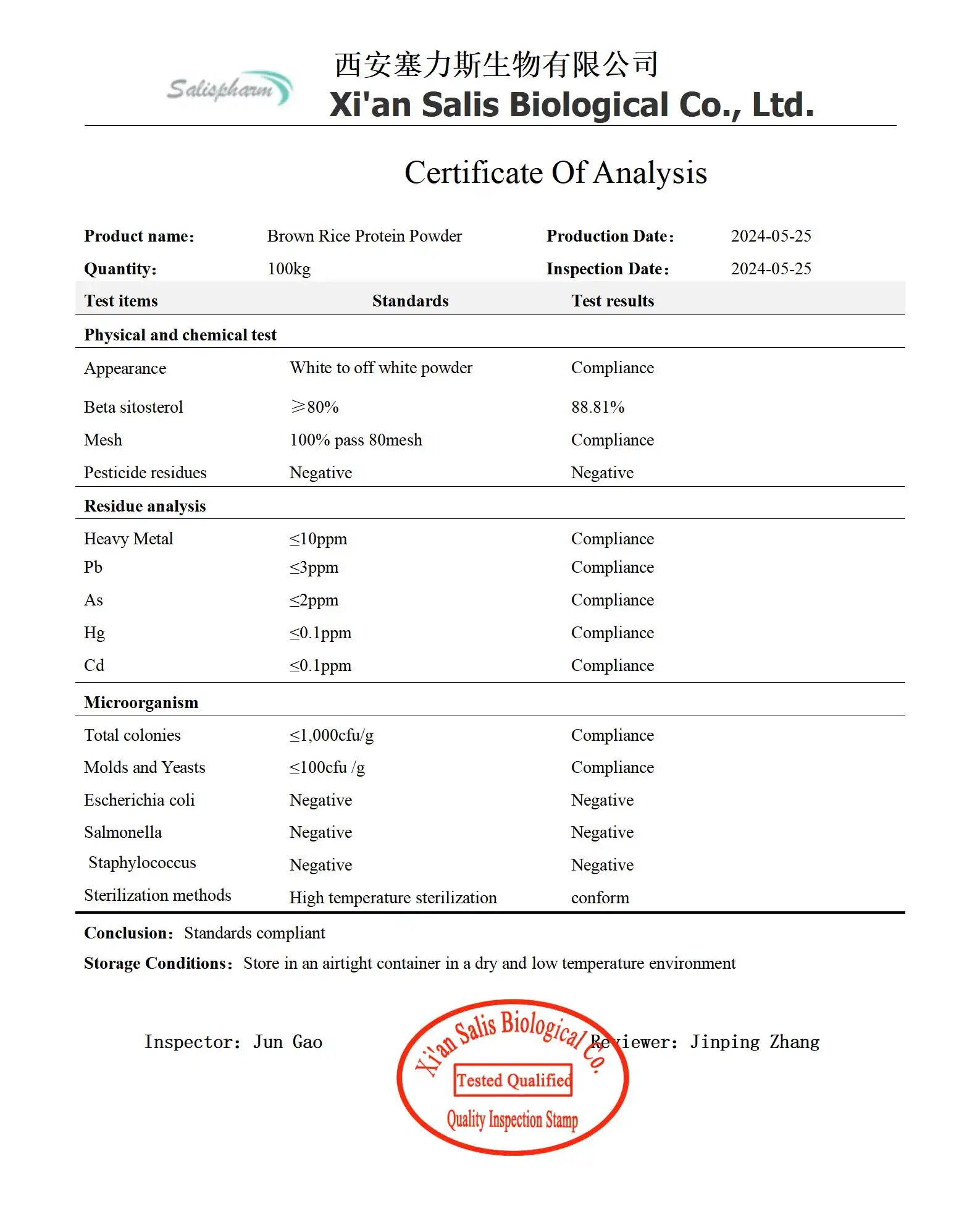
Is brown rice protein powder good for weight loss?
Brown rice protein powder can be an effective tool for weight loss when used as part of a balanced diet and exercise regimen. Here's how it can contribute to weight loss efforts:
- High protein content: Protein is known to increase feelings of fullness and reduce appetite, which can lead to lower calorie intake throughout the day. Brown rice protein powder typically contains about 24 grams of protein per 30-gram serving, making it an excellent source of plant-based protein.
- Low in calories: Compared to many other protein sources, brown rice protein powder is relatively low in calories. A typical serving contains around 120 calories, making it easy to incorporate into a calorie-controlled diet.
- Boosts metabolism: Protein has a higher thermic effect compared to carbohydrates and fats, meaning your body burns more calories digesting protein. This can slightly increase your overall metabolic rate, potentially aiding in weight loss.
- Muscle preservation: When losing weight, it's crucial to preserve lean muscle mass. Adequate protein intake, which can be supplemented with brown rice protein powder, helps maintain muscle during calorie restriction.
- Versatility in meal planning: Brown rice protein powder can be easily added to various recipes, from smoothies to baked goods, helping to increase the protein content of meals without significantly increasing calories.
However, it's important to note that brown rice protein powder is not a magic solution for weight loss. It should be used as part of a comprehensive weight loss strategy that includes a balanced diet, regular exercise, and lifestyle changes. Additionally, while brown rice protein is complete, containing all nine essential amino acids, it is lower in lysine compared to animal proteins. This can be easily addressed by combining it with other protein sources or consuming a variety of plant-based proteins throughout the day.
When using brown rice protein powder for weight loss, consider the following tips:
- Use it as a meal replacement or post-workout shake to help control calorie intake and support muscle recovery.
- Add it to your breakfast oatmeal or smoothie bowl to increase satiety and reduce mid-morning snacking.
- Incorporate it into healthy baking recipes to boost the protein content of snacks and desserts.
- Combine it with other plant-based proteins like pea or hemp protein to create a more complete amino acid profile.
- Be mindful of added ingredients in flavored varieties, which may contain extra sugars or calories.
Remember, sustainable weight loss comes from creating a calorie deficit through a combination of diet and exercise. Brown rice protein powder can be a valuable tool in this process, but it's not a substitute for a well-rounded approach to health and fitness.
How does brown rice protein powder compare to whey protein?
When comparing brown rice protein powder to whey protein, several factors come into play. Both have their unique characteristics and benefits, and the choice between them often depends on individual needs, dietary preferences, and health goals. Let's break down the comparison:
Protein Content and Quality
Whey Protein: Whey is a complete protein, containing all nine essential amino acids in optimal ratios. It's particularly high in branched-chain amino acids (BCAAs), especially leucine, which is crucial for muscle protein synthesis. Whey protein has a high biological value, meaning the body can utilize it efficiently.
Brown Rice Protein: While brown rice protein is also a complete protein, it has a lower concentration of certain essential amino acids, particularly lysine. However, studies have shown that when consumed in sufficient quantities, brown rice protein can be as effective as whey protein in supporting muscle growth and recovery.
Digestibility and Absorption
Whey Protein: Known for its rapid absorption rate, whey protein is quickly digested and utilized by the body. This makes it an excellent choice for post-workout recovery.
Brown Rice Protein: While not as quickly absorbed as whey, brown rice protein is still easily digestible for most people. Its slower absorption rate can be beneficial for providing a more sustained release of amino acids.
Allergen and Dietary Considerations
Whey Protein: As a dairy product, whey is not suitable for those with lactose intolerance, milk allergies, or those following a vegan diet.
Brown Rice Protein: Being plant-based, it's suitable for vegans, vegetarians, and those with dairy allergies or sensitivities. It's also naturally gluten-free, making it a good option for people with celiac disease or gluten sensitivity.
Taste and Texture
Whey Protein: Generally considered to have a smoother texture and more pleasant taste, especially in flavored varieties.
Brown Rice Protein: Can have a grainier texture and a more earthy taste, which some people may find less palatable. However, many brands have improved their formulations to enhance taste and texture.
Environmental Impact
Whey Protein: As an animal-derived product, whey protein has a higher environmental footprint in terms of water usage and greenhouse gas emissions.
Brown Rice Protein: Generally has a lower environmental impact, aligning with sustainability concerns.
Price
Whey Protein: Often more affordable due to its widespread production and availability.
Brown Rice Protein: Can be slightly more expensive, though prices have become more competitive as demand has increased.
In terms of muscle building and recovery, both proteins can be effective. A 2013 study published in the Nutrition Journal found that brown rice protein isolate consumption post-resistance exercise decreased fat-mass and increased lean body mass, muscle hypertrophy, power, and strength comparable to whey protein isolate.
Ultimately, the choice between brown rice protein and whey protein depends on individual factors such as dietary restrictions, personal preferences, and specific health goals. Many athletes and fitness enthusiasts find success by incorporating both types of protein into their diets, taking advantage of the unique benefits each offers.
Can brown rice protein powder cause bloating?
Like any dietary supplement, brown rice protein powder can potentially cause digestive issues, including bloating, in some individuals. However, it's generally well-tolerated by most people. Understanding the potential causes of bloating and how to mitigate them can help you incorporate brown rice protein powder into your diet more comfortably.
Potential Causes of Bloating
- Fiber Content: Brown rice protein powder contains some fiber, which can cause bloating in individuals not accustomed to high-fiber diets. Fiber is beneficial for digestive health but can lead to gas and bloating if increased too quickly in the diet.
- Protein Concentration: High protein intake, regardless of the source, can sometimes lead to digestive discomfort, including bloating. This is especially true if you're not used to consuming large amounts of protein.
- Individual Sensitivities: Some people may have a sensitivity to rice or specific components in brown rice protein powder, which could lead to bloating or other digestive issues.
- Additives: Some brown rice protein powders contain additives, sweeteners, or flavoring agents that may cause digestive discomfort in sensitive individuals.
- Mixing Method: Improper mixing can lead to clumping and the ingestion of air, potentially causing bloating.
Strategies to Reduce Bloating
If you experience bloating when using brown rice protein powder, consider the following strategies:
- Start Small: Begin with a smaller serving size and gradually increase it over time. This allows your digestive system to adjust to the increased protein and fiber intake.
- Hydration: Ensure you're drinking plenty of water throughout the day. Adequate hydration can help fiber move through your digestive system more efficiently.
- Timing: Experiment with the timing of your protein intake. Some people find that consuming protein powder immediately after a workout or between meals, rather than with a full meal, reduces digestive discomfort.
- Mixing Technique: Use a blender or shaker bottle to ensure the powder is well-mixed and to reduce the amount of air you might swallow.
- Choose Quality Products: Opt for high-quality brown rice protein powders with minimal additives. Look for products that are third-party tested for purity and quality.
- Enzyme Supplements: Consider taking a digestive enzyme supplement, particularly ones that contain protease to aid in protein digestion.
- Combine with Other Proteins: Mixing brown rice protein with other plant-based proteins, like pea protein, can sometimes be easier on digestion and provide a more complete amino acid profile.
- Probiotics: Incorporating probiotic-rich foods or supplements into your diet can support overall gut health and potentially reduce bloating.
It's worth noting that while some initial adjustment period is normal when adding any new supplement to your diet, persistent or severe bloating should be addressed. If you continue to experience significant discomfort, consider the following steps:
- Keep a food diary to identify any patterns or specific triggers.
- Try different brands of brown rice protein powder, as formulations can vary.
- Consult with a healthcare professional or registered dietitian for personalized advice.
- Consider alternative protein sources if brown rice protein consistently causes issues.
Remember, individual responses to dietary changes can vary greatly. What works for one person may not work for another. It's essential to listen to your body and make adjustments accordingly. For most people, brown rice protein powder is a safe and effective way to increase protein intake, especially for those following plant-based diets or with dairy sensitivities. With some experimentation and patience, many users find they can incorporate brown rice protein powder into their diets without experiencing bloating or other digestive issues.
Conclusion
Brown rice protein powder offers a versatile, plant-based protein option suitable for various dietary needs and fitness goals. Whether you're looking to support weight loss, build muscle, or simply increase your protein intake, brown rice protein can be an effective choice. By understanding its characteristics, benefits, and potential effects on digestion, you can make informed decisions about incorporating it into your diet. As with any dietary change, it's always best to introduce new supplements gradually and consult with a healthcare professional if you have any concerns.
If you are also interested in this product and want to know more product details, or want to know about other related products, please feel free to contact lea_slsbio@163.com,WhatsApp+86 13193326505.

References
1. Joy, J. M., et al. (2013). The effects of 8 weeks of whey or rice protein supplementation on body composition and exercise performance. Nutrition Journal, 12(1), 86.
2. Babault, N., et al. (2015). Pea proteins oral supplementation promotes muscle thickness gains during resistance training: a double-blind, randomized, Placebo-controlled clinical trial vs. Whey protein. Journal of the International Society of Sports Nutrition, 12(1), 3.
3. Kalman, D. S. (2014). Amino Acid Composition of an Organic Brown Rice Protein Concentrate and Isolate Compared to Soy and Whey Concentrates and Isolates. Foods, 3(3), 394-402.
4. Hoffman, J. R., & Falvo, M. J. (2004). Protein - Which is Best? Journal of Sports Science & Medicine, 3(3), 118-130.
5. Rigamonti, E., et al. (2016). Whey vs. Casein in the Regulation of Energy Balance and Body Composition: A 1-Year Postpartum Women Study. Journal of Diabetes Research, 2016, 1-9.
6. Ciuris, C., Lynch, H. M., Wharton, C., & Johnston, C. S. (2019). A Comparison of Dietary Protein Digestibility, Based on DIAAS Scoring, in Vegetarian and Non-Vegetarian Athletes. Nutrients, 11(12), 3016.

